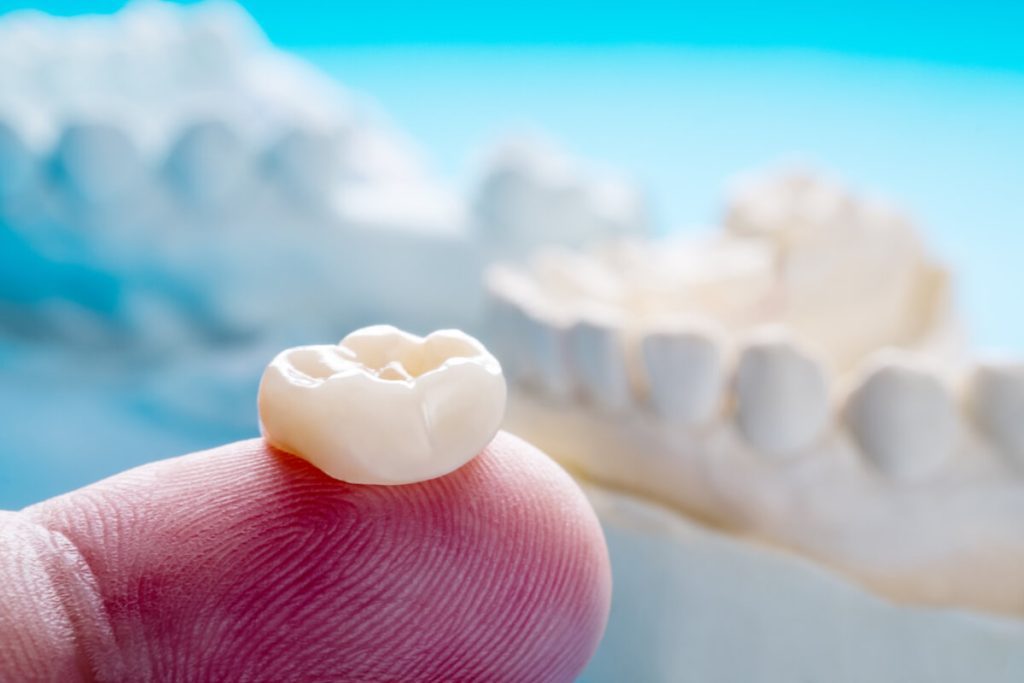Restorative Dentistry: Foods To Avoid When Wearing Dental Crowns

Restorative dentistry creates a dental crown to restore and improve a damaged tooth’s appearance and function.
A dental crown is a durable, form-fitting, and long-lasting ceramic sleeve that caps over a decayed, broken, and brittle tooth. Resembling a natural tooth, a dental crown is designed to fit the adjacent tooth while ensuring the correct bite.
However, it often takes your dentist a week or two to create and fit you with a permanent dental crown.
Protecting Your Temporary Crown
Restorative dentistry will first prepare your tooth to fit a temporary crown while waiting for your permanent dental crown. Because a temporary crown is often significantly more fragile than a permanent one, you must take extra precautions to care for it.
In this case, caring for your dental crown primarily consists of watching what and how you eat. For starters, you can avoid chewing hard foods like candies and nuts and cut down on your snacking.
Foods to Avoid with a Dental Crown
1. Solid Foods Like Candies and Nuts
Even though nuts, hard candies, and raw vegetables appear harmless, they can press on your dental crown. This pressure can compromise the crown’s adhesive strength, leading to cracking or total removal.
Refrain from using relatively softer foods or cooked vegetables during the first 2 days after crown placement.
Biting on hard or crisp foods should also be avoided since the tooth being treated is sensitive or the new crown has yet to wear properly.
2. Sticky Foods Like Caramels and Gum
Certain types of food, such as candy, caramel, taffy, chewing gum, or anything sticky, may exert pressure on your crown and make it loose. Though this may hold more or less true when temporary crowns are concerned, permanent crowns are still generally dangerous.
The vacuum produced in the teeth by sticky food causes a weak bond, characterised by discomfort or loss of the crown.
If you want something sweet, take yoghurt or some soft fruit—you won’t hurt your crown with them.
3. Hot Foods and Drinks
Although some hot foods and beverages will not harm the crown, they will make you uncomfortable if you experience tooth sensitivity.
Sometimes, after taking hot drinks like coffee or tea or foods like freshly baked products like pizza or even steaks, the tooth covered with the crown will experience some discomfort.
Sensitivity differs between individuals; if the gums are receded, it may range from mild to severe at times.
If you are sensitive to hot foods or beverages, avoid eating them when hot and wait for them to cool. If sensitivity continues to be a problem, visit your local dentist.
A slight shifting of the crown may reduce the occurrence of such a condition.
4. Cold Foods and Drinks
Conversely, cold foods and drinks can also trigger sensitivity, especially if the root of the crowned tooth is exposed or if there’s been significant gum recession. Ice-cold foods like ice cream, chilled beverages, or iced water can be uncomfortable for many patients with dental crowns.
Suppose you are still fond of consuming cold foods such as ice cream. In that case, it is wise to see your dentist to discuss options for using desensitising toothpaste or any other product that can help solve the sensitivity problem in the long run.
Such products can create a barrier through which the crowned tooth does not feel the effects of fluctuating temperatures.
5. Sugary Foods and Drinks
Dietary restrictions may loosen once the permanent crown is fitted, but caution is still advised, particularly with sugary foods and drinks.
While the crown is made from non-decomposable materials, the tooth tissue used underneath is not immune to cavities and other problems.
This is because sugars stimulate bacterial activity and create plaque around the object, crowning the tooth.
Tooth decay that erodes the natural tooth underneath the crown may develop as a complication of poor oral hygiene, leading to gum disease.
The only way to protect your crown and the adjoining teeth is to avoid taking sweet sweets and take adequate care of your teeth.
Brushing twice a day, flossing around the crown, and visiting your Main Beach dentist for regular check-ups are essential steps in prolonging the life of your dental crown.
Maintaining Your Dental Crown
Dental crowns are an incredible tool in restorative dentistry. They provide aesthetic and functional benefits for patients with damaged or decayed teeth.
However, if you want your crown intact, you should make good nutritional decisions to keep it.
To help keep your crown in excellent condition, avoid hard, sticky, hot, cold, and sugary foods.
It’s also important to call your dentist if you feel any discomfort in your mouth or teeth sensitivity.
If properly maintained with proper hygiene and consistent visits to your dentist, your crown will remain in the best condition, and your smile will, too.
Dental Crown Management in Main Beach
At Main Beach Dental, we’re dedicated to providing high-quality restorative dentistry solutions, including durable dental crowns that blend seamlessly with your natural teeth.
If you’re experiencing sensitivity or have concerns about your dental crown, contact your Main Beach dentist at (07) 5503 1177 to schedule an appointment.
Visit us at 11/26-30 Tedder Ave in Main Beach.
